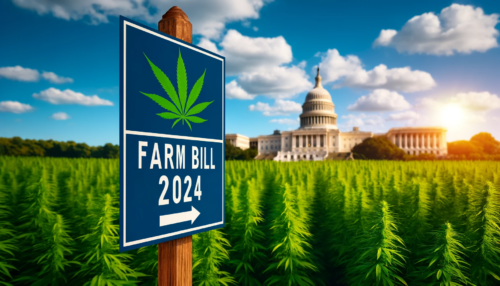Farm Bill Framework Seeks to Define Hemp, Skips Mention of Delta-8 THC
In a significant move, Democratic leaders on the U.S. Senate Agricultural Committee have revealed a framework for the upcoming U.S. Farm Bill that aims to clearly define industrial hemp. Unveiled on Wednesday, this framework offers a detailed glimpse into the future of hemp regulation in the United States but stops short of addressing the controversial hemp-derived cannabinoid, delta-8 THC.
Defining Industrial Hemp
The 2018 Farm Bill legalized industrial hemp production across the nation, inadvertently paving the way for the proliferation of intoxicating hemp-based cannabinoids. However, the new framework aims to fine-tune the definition of industrial hemp, specifically targeting the reduction of regulatory barriers for farmers cultivating hemp for grain and fiber.
Removing Hemp’s Felon Ban
Another notable aspect of the framework is the proposed elimination of the current ban on individuals with felony convictions from participating in hemp production under the U.S. Domestic Hemp Production Program. This restriction, initially a compromise in the 2018 Farm Bill, has long been a contentious issue.
Miller expressed his enthusiasm about this development, noting that the U.S. Hemp Roundtable has been advocating for the repeal of the felon ban since its inception. “We think farmers who have paid their time should be able to grow a completely legal crop. We also don’t want other farmers hassled with having to get background checks when they haven’t done anything wrong, either,” he added.
Republican Response and Industry Reaction
Meanwhile, Republican leaders from the House Agricultural Committee have also put forth their framework for the 2024 Farm Bill, which notably omits any mention of hemp. Despite this, the priorities outlined by the Hemp Roundtable, including the reduction of regulatory burdens and the repeal of the felon ban, are gaining traction, having been co-signed by 33 nonprofit groups representing domestic hemp farmers.
Miller remained cautiously optimistic, stating, “The devil’s in the details, but any progress on this front would be very much welcomed by the industry.”
The Ongoing Delta-8 THC Debate
Despite the strides made in defining industrial hemp, the framework remains silent on the issue of delta-8 THC and other intoxicating cannabinoids derived from hemp. This omission is particularly noteworthy given the ongoing debate and state-level bans concerning these substances.
Since the 2018 legalization of hemp, there has been a surge in the popularity of cannabidiol (CBD), leading to an oversupply of hemp. This, in turn, spurred chemists to synthesize delta-8 THC from excess CBD, introducing a new layer of complexity to hemp regulation.
In March, 20 state attorneys general urged Congress to address the issue of intoxicating hemp cannabinoids, suggesting that they pose a “health and safety crisis.” Despite these concerns, neither the Senate nor the House frameworks make any mention of delta-8 THC.
Miller highlighted the potential repercussions of regulating hemp-based cannabinoids like marijuana, cautioning that such measures could disrupt the non-intoxicating CBD industry. “We’ve been afraid that the Farm Bill might include that language and have been lobbying very aggressively not to see it. So far, it wasn’t mentioned in either bill, and we hope it doesn’t find the light of day,” he stated.
Looking Ahead
As the debate over hemp regulation continues, U.S. hemp farmers remain in a state of limbo, awaiting concrete legislative action. The new Farm Bill framework’s focus on reducing regulatory burdens and removing barriers for felons marks a positive step for the industry. However, the unresolved issue of delta-8 THC and similar cannabinoids will likely remain a contentious topic as lawmakers seek to balance economic opportunities with health and safety concerns.
The 2024 Farm Bill represents a pivotal moment for the hemp industry, with the potential to shape the future of hemp cultivation and production in the United States. Stakeholders across the industry will be closely monitoring legislative developments, hoping for a balanced approach that supports both innovation and safety.
As the Farm Bill progresses, the hemp community must remain vigilant and proactive, ensuring that their voices are heard and that any new regulations reflect the evolving landscape of hemp production and cannabinoid use.
***
Trap Culture is the ultimate destination for cannabis enthusiasts who want to experience the best of Arizona’s cannabis culture. Whether you are looking for the hottest cannabis-friendly events, the latest news about everything from cannabis rescheduling to trends in the industry, or the most exclusive and limited-edition products from the top brands in the market, Trap Culture has you covered. Visit our website to learn more about our events, our blog, and our store. Follow us on social media to stay updated on the latest news and promotions. Join the Trap Culture family and experience the most immersive and engaging cannabis-friendly social events in Arizona.

